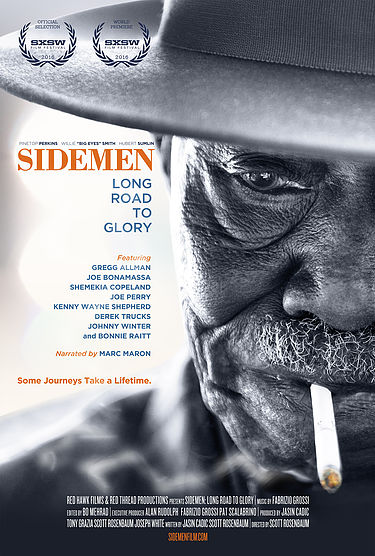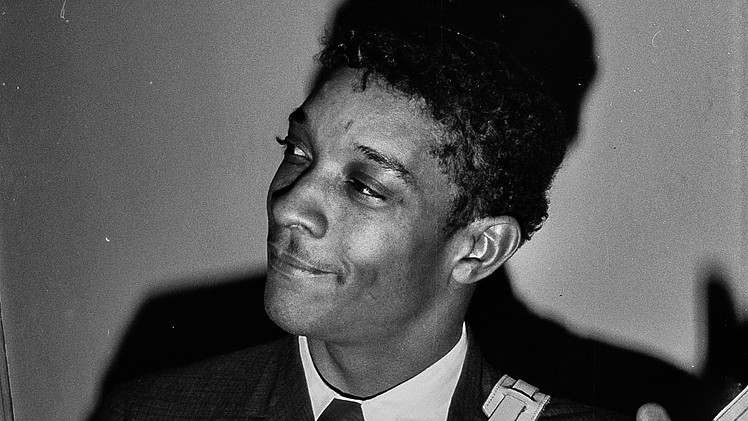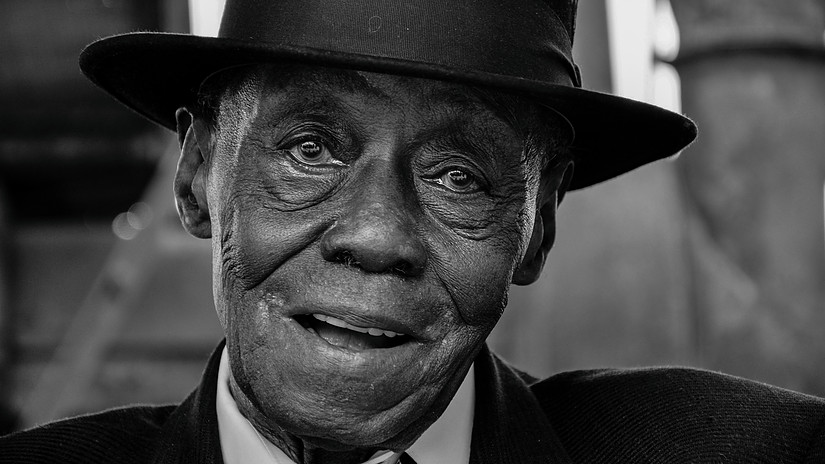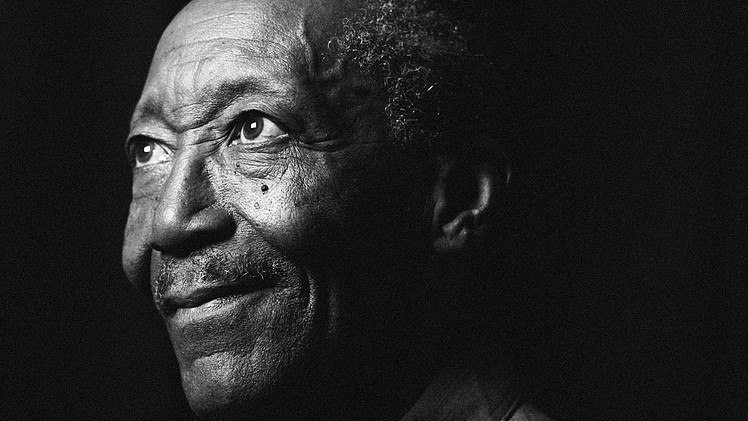
There are no other genres in the history of music able to tell stories like the blues does. Some of those stories may have a happy ending, some other a less happy one. Still, they are genuine real life stories, whose players often go through hard existences, highs and lows, good times and bad times. The genuinity and honesty of those life tales is what creates the empathy, the real connection between artists and the blues fans.
Through the last quarter of a century, very few directors have been able to portrait the spirit and the message of the blues as well as director Scott Rosenbaum has been able to do with his new film, Sidemen - Long Road To Glory.
The film/documentary is a phenomenal and moving celebration of the life and career of pianist Pinetop Perkins, guitarist Hubert Sumlin and drummer Willie "Big Eyes" Smith, three of the most important and talented Sidemen in the history of blues, which worked side by side with giants of the genre like Muddy Waters and Howlin' Wolf.
Bluebird Reviews is truly honoured to talk to director Scott Rosenbaum about the making of this wonderful labour of love for blues music and tribute to some of the greatest blues musicians of the last century.

Hubert Sumlin (Photo by Brian Smith)
BBR - Hi Scott, thank you for being with us today to talk about Sidemen. The film is not just a heartwarming homage to the blues genre but also to the life and career of three wonderful musicians like Pinetop Perkins, Hubert Sumlin and Willie Smith. How long did it take for you to prepare and assemble all the footage?
SR - Ultimately, it ended up taking 7 years to complete the film. It was initially conceived as a concert film, celebrating the music that they were either directly part of, also in terms of the legacy they represent with the music of Muddy Waters, Howlin' Wolf and all that music that inspired the rock and roll generation that I grew up with. So it started out as a couple of years' adventure, but ultimately, after their deaths in 2011, the logistics required to complete the film ended up being much longer.
BBR - To be Sidemen, as Pinetop, Willie and Hubert have been, takes dedication, sacrifice, hard work and an immense love and respect for music. Why, in your opinion, did it take so long for the music industry to recognize the value of their talent and award them, coincidently, in the same year in which they all sadly passed away?
SR - Well, you know, I think in some ways and also by speaking to a number of people, even to the musicians themselves about this, I think they (Pinetop, Willie and Hubert) were some of the very lucky ones, in a way. I mean, when you think about the blues, how many guys for every Willie, Pine and Hubert, how many great musicians are there that no one ever really knows about? When these guys were coming up, the music was mainly made down south and if it wasn't for people like Alan Lomax and his father, who went down there and recorded Muddy's music and all the stuff coming from the plantations, all that material would have been otherwise lost forever. As far as it did take for these guys to be recognized and awarded, I think in the end it was really a great thing that they got the recognition at all. Hopefully, Pinetop, Willie and Hubert will represent, through that award, all those fantastic musicians that had long gone before and never be known to the world
BBR - Your personal relationship to Pinetop, Hubert and Willie goes way back, I believe, to 2008 when you worked together on your debut feature film, The Perfect Age Of Rock'n'Roll, released in 2011. Is it true that you initially thought of making, instead of Sidemen, a blues version of Scorsese's The Waltz, dedicated to the tradition and the legacy of the Delta and Chicago Blues?
SR - That is correct. When I had the good fortune to meet these guys, originally, I wanted to do a modern day version of The Last Waltz, with these fabulous bluesmen to be the core band of the movie and then to get all the rockers to use the blues as the inspiring muse that brought them to come out and play. The perfect example of what I had in mind is the Robbie Krieger sequence, in Sidemen. It's the scene when Robbie is playing Little Red Rooster with Hubert. Naively, when I was a kid, I knew that song originally from The Doors as I knew as well, originally, Mannish Boy to be a Rolling Stones' song! So that was the genesis of it all. To see The Last Waltz the first time and seeing Muddy Waters, that feeling brought the initial thought of a concert film. Of course, it was never going to be like the Scorses's way, by calling up Eric Clapton or Mick Jagger, asking to come down and do the job. What we did instead, was to put a tour together and we shot three or four concerts. Along the way, the Tour Manager, the agent of these guys had some relationships within the music industry and was able to reach out to artists like Robbie Krieger, Elvin Bishop and Timmy Reynolds from the Dave Matthews Band, to help with this project. It wasn't though a full concert of songs, like I had wanted, of all the Muddy, Wolf and John Lee's most popular songs. Then it all cast away, two and a half year in the filming. When I got in touch with (Producers) Pat Scalabrino and Fabrizio Grossi, at the time I was still trying to keep the project going, especially after the death of those guys and I couldn't really figure out what the film would have been about, at that point. It was completely an uncharted territory for me and I got to the point where I was very disillusioned about the whole project. I had no idea how to reach out to all the blues and rock artists appearing in Sidemen, celebrating these guys' life and career until I met Pat and Fabrizio. Through them, I got the right shot in the arm that I needed. They opened me the doors to so many of these artists and that was really much needed for me to allow the project to go ahead.

Pinetop Perkins (Photo by Kim Welsh)
BBR - How easy was it for you to reach out to all the music stars of the current blues/rock scene and ask them to share their feelings and experiences about Pinetop, Willie and Hubert?
SR - Well, that question requests a two-parts answer. The entire film would only be possible because of the love that so many people and so many musicians had for Pine, Willie and Hubert. They were so well known, certainly within the music community, if not, by even a wider audience. Once I was able to get through the artists, through their managers and all the people that revered Pine, Willie and Hubert, as soon as they knew that a film was going to be made about them, helped me to open contacts with all those artists. The other part of that equation, of course, was people like the producers Pat Scalabrino, Fabrizio Grossi and the agent Hugh Southard, who represents these bluesmen. Those guys were really instrumental in helping me to interview the great musicians appearing in Sidemen and to speak to them about the influence they got from Pine, Hubert and Willie. We had such a great response from all those great musicians we interviewed. In the end, we had something like 50-60 interviews ready, but we couldn't put them all in the film. This is just to give you an idea about the enthusiastic support we had from all those generous musicians, while we were making Sidemen.
BBR - The film is beautifully narrated by Marc Maron, a comedian with a strong legacy to the world of music. Has he been the first choice as the main narrator since the beginning?
SR -We had talked about several choices for narrators and we put together a shortlist. Marc Maron was definitely at the top of that shortlist , partly because my co-producer Jasin Cadic and I are big fans of his podcast and what he has been able to do with that interview format that he so well does. I think his voice is really one of the foremost voices of pop culture and culture in general, right now and we wanted the film to have that freshness coming from a non-stereotypical narrator like Marc. Add to that the love and appreciation that Marc has about history of music, as much as we have too and you will be able to figure out why Marc was the perfect choice for us.
BBR - We absolutely loved the way you turned on and off the light on Sidemen, with Pinetop walking onto the stage in an old, abandoned theatre in absolute silence at the beginning of the film and to have him walking off stage after the end credits with the camera gently fading out. One gets the feeling he really connected with you, during the making of Sidemen. What are your immediate memories about Pinetop?
SR - The memories, not just of Pinetop but of all of them, are pretty similar in terms of having had the good fortune to have met them and to hear their stories on first hand basis. Greg Allman said in the film, and I really relate to that: "It's just like sitting down with your Grandpa!". And it was, but these were Grandpas that had these incredible stories, with first hand knowledge of Robert Johnson, John Lee Hooker, of course Muddy and Wolf and all these legendary bluesmen. Just meeting them and having this wonderful experience with them was for me personally a once in a lifetime opportunity. I feel so fortunate that I met them when I did, when we had initially the notion of making a film together, at the time.
BBR - How difficult is it, in today's movie industry world, to put together a group of people prepared to invest and to believe in this magnificent labour of love and passion for the history of the blues, which is Sidemen?
SR - It's very difficult. I don't know whether it is more difficult today than it was 40-50 years ago but I know that it's always challenging to get somebody to believe in a concept or a vision. This film was completed two ways; on one side we had a seriously good investment made by our executive producer early on, which was critical to start the project. On the other one, we really made Sidemen out of sheer passion. We brought our own cameras, we went out, we made it largely on ourselves without a lot of support. After these three musicians, which became our friends too, passed away, it became something so much more than just making a movie. Of course, we wanted to complete the film but we really took very seriously the fact that these men trusted us with their legacies and we had captured some of their last performances, interviews and general footage. I would venture to say that the material we recorded of those incredible men was of such a highest quality that I don't believe anyone had ever been able to capture in the same way before. So, it became our own mission, a mission from God, quoting a line of The Blues Brothers' movie.
BBR - I heard you are working already on the follow up to your 2011's film debut The Perfect Age Of Rock'n'Roll. From where does the special bond that you have between filmography and music come from?
SR - That's a good question. Music was always part of the household. I grew up between my dad, a big music fan that had at home a turntable with all these fantastic records that I was just fascinated by and my uncle, which was a drummer and a little bit of a legendary figure to me. He was my gateway to music, telling me all these great music stories. He also turned me on to The Band, which was not maybe the most fashionable band for kids growing up in the 70's-80's but I do remember how seriously hooked I was to that fantastic album that is The Last Waltz. I guess that the bond you referred to in your question might have started back there, with that album, which incorporates so many elements of traditional blues. Music has always been a big component of my life, always will. It's something vital for me, a bit like oxygen that allows me to live and breathe.

Willie "Big Eyes" Smith (Photo by Jessie Lirola)
BBR - Scott, this is a very critical moment for music on many levels. It is becoming increasingly difficult for rockstars or popstars to sell records worldwide. Blues, though, this ultra-octogenarian evergreen genre, does not seem to suffer in this respect as much as other genres. In your opinion, what is the secret that keeps the blues alive and kicking after all these years despite all?
SR - That's a great question and it is relative to the state of the global music industry today, because other forms of music have not gone essentially through to what blues has been through the last century. If you think about the highs and lows, fading in and out of style, all kind of transitions that musicians have to deal with, which today happens to be streaming or digital downloading, to be a musician is not easy at all. But as far as blues and its survival goes, there's something to me and I think all people who are attracted to the blues, that makes the genre so special and is the fact that the blues is so elemental and pure. The blues is the foundation, it is the root, from which many different music genres have taken inspiration from. There is something so powerful about the guy or the girl sitting down with the guitar making music that will always attract people, no matter what. Just to give you an example, time ago I was screening the film to people that has no connection or knowledge about the blues whatsoever and suddenly I realised once again how much of an impact the blues can make on people when they hear it. Besides being moved by the film, those people I was referring to came to me after watching Sidemen saying: "You know, I really liked that music, perhaps I should listen to it a bit more". That's what it is. When you hear it, blues can make a really strong grip on people forever, almost becoming part of your DNA.
BBR - Should you define with one adjective each of the musicians featured in Sidemen, which one would you choose?
SR - Just perseverance. Absolute perseverance. That has been so important to me too. You know, struggling to make this film over seven years, it's not too difficult to stop and think, as you are getting down: "Wait a minute, I am making a film about three guys who spent, six or seven decades pursuing their careers and going through a lot of low times". So, their perseverance has always been an inspiration in making this film and, as an artist, it will always be an inspiration to me. Because they went through such hard times that, when I think about my situation, personally and I compare my life to theirs, they really went through hell and back and still persevered to play until a very old age, despite going through highs and lows. What a tremendous inspiration they have been to me. I hope we were able to catch that perseverance in Sidemen too. They were the nicest guys in the world. I feel very fortunate to have met them and have this experience with them. I hope the film captures just how genuine and talented and sweet these men were and the audience can get the same feeling that we had while we were making the film.
Giovanni "Gio" Pilato
http://www.sidemenfilm.com/#!about/m6qj2

